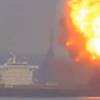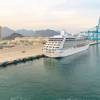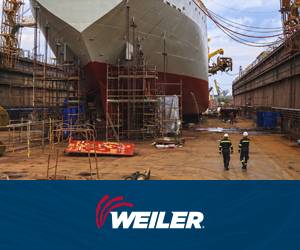INSIGHTS: from Crowley's Todd Busch
Todd Busch: SVP and General Manager, Technical Services at Crowley Maritime Corporation.
Todd Busch joined Crowley as an ordinary seaman in 1986, earning his masters’ license working aboard company tugboats before coming ashore in 1994 as a tug dispatcher. Since then, he has held a variety of positions with increasing responsibility within the firm. Today, the 24-year Crowley veteran is a member of the company’s senior leadership team, reporting directly to Crowley CEO Tom Crowley. Based at Crowley’s headquarters in Jacksonville, FL, he is responsible for several of the company’s business enterprises including the project management organization PMOrg (known as Crowley solutions), as well as subsidiaries Titan Salvage, Jensen Maritime Consultants, and Intrepid Ship Management. Collectively these technical services encompass marine salvage and wreck removal; naval architecture and marine engineering; vessel construction management; ship management; offshore support; vessel chartering; project management and government contract services.
The 2002 recipient of the Thomas B. Crowley trophy – the highest honor a Crowley employee can receive – Busch has additionally represented Crowley in the International Salvage Union (ISU), and served on the executive committee for the past 7 years. In 2009 he was elected to President of the ISU, a position he held until September 2011. Beyond this, he has also served as a director of the Clean Pacific Alliance and the Marine Response Alliance. Todd’s views are therefore particularly relevant and he brings MarineNews readers up-to-speed on all things “salvage” in this month’s version of INSIGHTS:
The heightened awareness for the marine environment and the role that salvage has to play in that equation are both important components to a happy ending in marine casualties. Where salvors make best efforts to contain an environmental disaster and the final salvage value does not reflect those efforts, making the salvor whole can be problematic. What’s the solution?
The International Salvage Union has promoted the idea of adding a component to Lloyd’s Open Form (LOF) to address these types of situations where the environment is threatened, and the response of the salvor has saved damage to the environment. You mentioned a happy ending; this is a win-win for all involved. It protects the environment, saves the responsible party from additional costs related to the environmental damage that could have occurred, and justly rewards the salvor for his efforts.
The new U.S. Coast Guard Fi-Fi rules are in place for responders, Q&I’s and salvors. U.S. salvors – particularly in way of ASA – had a hand in guiding that through. Are you happy with the rules? More importantly, do you see the rules fostering positive change in the marine & salvage communities?
The rule changes that resulted from the update to salvage and firefighting requirements under OPA 90 are a definite step in the right direction. The ASA and its members have worked with the US Coast Guard (USCG) throughout the process. The regulations have made the response community better prepared for a casualty occurring in the US. The USCG will need to stay engaged to ensure compliance by all parties. The true test will be when a major casualty takes place.
Responder immunity is always, and for very good reason, a hot button issue. Just as important as making a salvor whole in a less-than break-even situation, liability for salvors that make tough decisions in environmentally sensitive jobs must be addressed. What’s your take on the problem and what can be done to ensure fairness?
This issue has been at debate for a long time. In recent years, we have seen circumstances where a salvor has been put in jail and charged with a criminal offense. The coastal state regulatory bodies need to enact legislation protecting the salvor during his response. The salvor is the first line in stopping and minimizing further damage to the environment and people, and is there to act for the greater good of all stakeholders. They should not be penalized for these efforts.
Salvage, by its very nature, is a very specialized profession; utilizing mission-specific equipment and vessels. As the qualified personnel now in the business begin to retire, where will we get the next generation of salvage masters and marine engineers? Is there a professional training path beyond learning on the job and coming up through the hawse pipe, so to speak?
This has always been an issue, but is becoming more important today and in the future. Salvors have usually come from marine related backgrounds. They have sailed on vessels, been divers, and operated heavy equipment; the good ones are a bit of jack-of-all-trades. Today, fewer people want to go to sea, they do not want to be gone from home for long periods of time, and most do not want to put in the time to gather practical knowledge. It makes it harder for salvage companies, as the available pool of resources is much smaller, and requires greater efforts to secure the next generation. Like most shipping companies, we need to look hard to find people that want to commit to this industry and lifestyle.
Salvage equipment and hulls, by their very nature, are expensive to maintain sand often, can go for long periods with no work or little utilization. For salvors, it can be a difficult financial balance – staying ready and paying the bills. How do you position your equipment to ensure maximum work and yet be ready to respond to a casualty, when necessary?
Titan is different than most salvage companies; we do not keep a large fleet of floating assets. Our model is for highly skilled personnel and specialized salvage equipment that can respond to a casualty anywhere, very quickly. There are tugs, barges, cranes and other floating craft throughout the world, that we can quickly secure for charter to support the salvage efforts. This allows us to focus on emergency response and not worry about keeping the floating assets employed. The assets that you own are usually somewhere other than where you need them. Our parent company, Crowley Maritime Corporation, has a large fleet that we can access if they are positioned correctly, if not, we go to market.
Local and regional salvage companies now think they can compete on the world stage. Increasingly, they bid on jobs that typically would have been bid out to 4-5 companies with the financial wherewithal and proven experience to do the job. Now you may have 10 or more companies bidding on work, and it could cost a half a million dollars or more to do the survey, draw up the plans, do the diving and complete the RFP. At the end of the day, only one company gets the work and the others are out a lot of money. How do you balance the need to participate in the bid process with the knowledge that you might not be the “winner” on a given day?
The salvage industry has become very competitive in recent years. Many companies that have traditionally worked within a localized region now are offering services globally. This has driven the revenues for the responses much lower, often at near breakeven, and made commercial contract responses much more frequent. This has put pressure on jobs that may have traditionally been an LOF, and it has increased the liability to salvors. The responsible parties are enjoying this, as it makes their costs lower and often transfers risk to the salvor for very little reward. Titan only performs emergency response, salvage and wreck removal, so we are committed to the industry. We are also as innovative in our commercial offerings, as we are with our technical solutions.
Large salvage jobs are increasingly being awarded to one firm that ultimately sub-contracts to one or more others to ensure adequate coverage. If and when you do this sort of thing at titan, what’s your vetting process for those you would entrust with a piece of an overall job that you have been awarded?
Titan has relationships with most of the companies that provide services supporting our needs. We work with those companies building trust and cooperation. If we bring in somebody new, that we have not worked with before, with spend a lot of time managing and supervising them to ensure they provide the quality and safety we require. This is a fairly small industry, so most of the primary companies are known and have a reputation and experience to draw from.
Arctic operations are getting a lot of attention these days. Is Titan positioned to respond as tourism, energy exploration and shipping increase their local footprint in waters that were previously icebound? What’s the business equation to that quandary?
Titan has performed services in the arctic, and is well positioned for a response to this region. Additionally, Crowley has been working in the arctic for over 50 years, and has a lot of experience supporting the oil and gas, and mining industries during the exploration, production and decommissioning phases. Together, Titan and Crowley are well positioned for the growth expected in the arctic region. Jensen, our naval architecture and marine engineering company, does a lot of work in support of companies working in the arctic. We have response equipment, as well as floating assets, positioned throughout Alaska. We have also worked in the Canadian arctic and are currently working in the Russian arctic.
What’s the most pressing issue for salvors today – on a local, North American level? Globally? How about for your business? As part of a much larger, dynamic marine organization, are Titan’s concerns the same as say – one of you competitors?
Titan Salvage is a wholly owned Crowley company, as is Jensen Maritime. Crowley supports most all aspects related to marine project solutions, transportation and logistics. These businesses’ have different risks associated with them, but are synergistic to one another. This allows us to provide a wide range of solutions to our customers. Each Crowley unit has a business plan, which takes into account the risk vs. reward, and executes the plan accordingly. The diversity of the business units helps make Crowley the unique company that it is. Being a part of Crowley allows Titan to have the financial strength and staying power, to respond globally and simultaneously to multiple salvage and wreck removal projects, including those that are the largest and most complex.
(Published in the August 2012 edition of MarineNews - www.marinelink.com)












